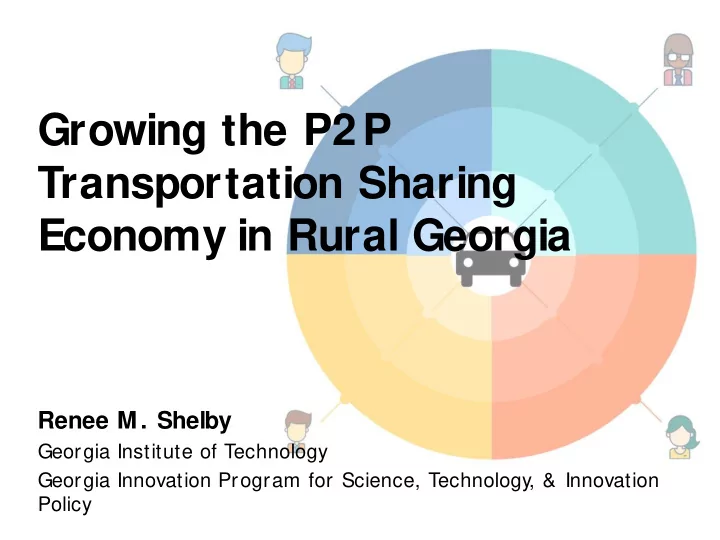

Growing the P2P Transportation Sharing Economy in Rural Georgia Renee M. Shelby Georgia Institute of Technology Georgia Innovation Program for Science, Technology , & Innovation Policy
1. DEFINITIONS 2. METHODOLOGY 3. W HY P2P TRANSIT 4. FOUR MODELS 5. BEST PRACTICES
W HAT IS THE TRANSPORTATION SHARING ECONOMY?
SHARING ECONOMY An economic model based on sharing underutilized assets from spaces to skills to stuff for monetary or non-monetary benefits. PEER (P2P) ECONOMY Person-to-person marketplaces that facilitate the sharing and direct trade of products or services built on peer trust. TRANSPORTATION P2P ECONOMY Uses digital technologies to connect lay drivers to riders.
1. Sign up on app or website 2. Summon or schedule a ride 3. Payment is automatically deducted 4. Rate driver/ rider
RESEARCH QUESTION How can we introduce (or expand) P2P transportation in rural Georgia as economic development? METHOD Reviews of . . . + Academic literature + Tech journals + Federal transportation research + Failed apps Created . . . + Database of P2P apps nationally Interviews with . . . + Founders & reps from transit apps
HOW IS THIS ECONOMIC INNOVATION?
Technology allows owners to create value out of cars, and allows users to access that value. Concept from KS12’s Emergence Collective, The Future of Money.
“The success of Uber [and apps like it] isn’t a fad, it’s a new way of doing business.” --PricewaterhouseCoopers “The Sharing Economy: A New W ay of Doing Business.” Dec. 11 2015. W harton, University of Pennsylvania
Sharing Economy & Traditional Rental Market Projected Revenue 2013 2025 “The Sharing Economy: A New W ay of Doing Business.” Dec. 11 2015. W harton, University of Pennsylvania
W HY EXPAND RURAL P2P TRANSIT IN GEORGIA?
CREATE IMMEDIATE JOB GROW TH Do not have to wait until formal institutions hire or open. EXPANDS & EXPEDIATES EXCHANGE Payments are received in less than 7 days. OFFERS FLEXIBLE EMPLOYMENT Drivers set their own hours, clocking in and out as they please. REDUCES REGRESSIVE TRANSPORTATION COSTS 86% of users report it makes life more affordable. “The Sharing Economy: Consumer Intelligence Series.” 2015. PricewaterhouseCooper.
EASI Analytic from 2010 Census Data PL 94-171. EASI Analytic created an index (where 100 is the national average) using variables from the Census. No Cars, reflects households with no personal transportation in a geographic area. Profiles are based on relative rankings of each of the components compared to the national average.
GIG W ORKERS GET FEW BENEFITS Workers are treated as independent—not part of the company ON DEMAND ECONOMY RAISES LEGAL ISSUES Issues like how to regulate & treat workers are still being litigated DIGITAL DIVIDE PERSISTS Users are likely to be urban, wealthier, and younger IT IS DISRUPTIVE The impact to the traditional economy is unclear
KINDS OF P2P TRANSIT APPS?
Database created from analysis of tech journals, app store searchers, and
CHARACTERISTICS OF 22 P2P TRANSIT APPS ANALYZED 0 2 4 6 8 10 12 14 Mobility on Demand 13 Taxi Hailing Apps 7 Carpooling 4 Scheduled Rentals 1 Fixed Payments 11 Riders Set Payments 4 Failed Apps 4 Region Specific 3 Database created from analysis of tech journals, app store searchers, and
FOUR P2P MODELS THE GODFATHER THE CORPORATE ANCHOR THE RURAL HYBRID THE FAILURE
THE GODFATHER UBER
UBER Basics On demand ride summoning Phone interface Payments are fixed No advance scheduling Lesson Relies on critical mass
GEORGIA UBER Atlanta Athens Augusta Coastal Georgia (beta) Savannah-Hilton Head
THE CORPORATE ANCHOR ZIMRIDE
ZIMRIDE Basics Carpool & Onetime Travel Web interface Riders set payments Only advance scheduling Lesson Anchor around an institution
GEORGIA ZIMRIDE PwC Emory University Gulfstream Verizon
THE RURAL HYBRID CARMAHOP
CARMAHOP Basics Onetime Travel Digital Hitchhiking Riders set payments No advance scheduling User driven Lesson You can make your own model
THE FAILURE SIDECAR
SIDECAR Basics On demand ride summoning Phone interface Payments are fixed No advance scheduling Relies on critical mass Lesson Too small a network
9 out of 10 app-based startups fail. Griffith, Erin. (2014). W hy Startups Fail, According to their Founders. Fortune.
TOP 5 REASONS APP STARTUPS FAIL No Market Need 42% Ran Out of Cash 29% Not the Right Team 23% Get Outcompeted 19% Pricing/ Cost Issues 18% Based on analysis of 101 startups post-mortems. CB Insights. (2014)
LESSONS FOR INCREASING RURAL P2P TRANSPORTATION
Uber Rural areas will not be serviced by major P2P apps e.g. Uber in near future Zimride Most users will not trust companies until they are recommended by someone they trust Carmahop Rural areas can design own platforms to suit their region’s needs Sidecar Networks must be large to be Pew Research Survey conducted Nov. 24-Dec. 21, 2015. “Shared, Collaborative and On Demand: The New Digital Economy.” successful “The Sharing Economy: Consumer Intelligence Series.” 2015. PricewaterhouseCooper. Personal communication with representatives from Uber and Lyft (June 2016).
BEST PRACTICES FOR PROMOTING RURAL P2P TRANSPORTATION
BEST PRACTICES + Involve the community > Tailor to community needs > Promote & advertise > Encourage independent invention > Think Carmahop > But remember fail rates are high + Partner with nearby counties > Enhances value of local P2P network + Find funding when needed > Mobility On Demand Sandbox > Up to $8 million in funding > Smart Cities Challenge > www.transportation.gov/ smartcity + Consider creating a regional challenge
CONTACT RENEE M. SHELBY 404.502.1256 RENEESHELBY@GATECH.EDU
Recommend
More recommend